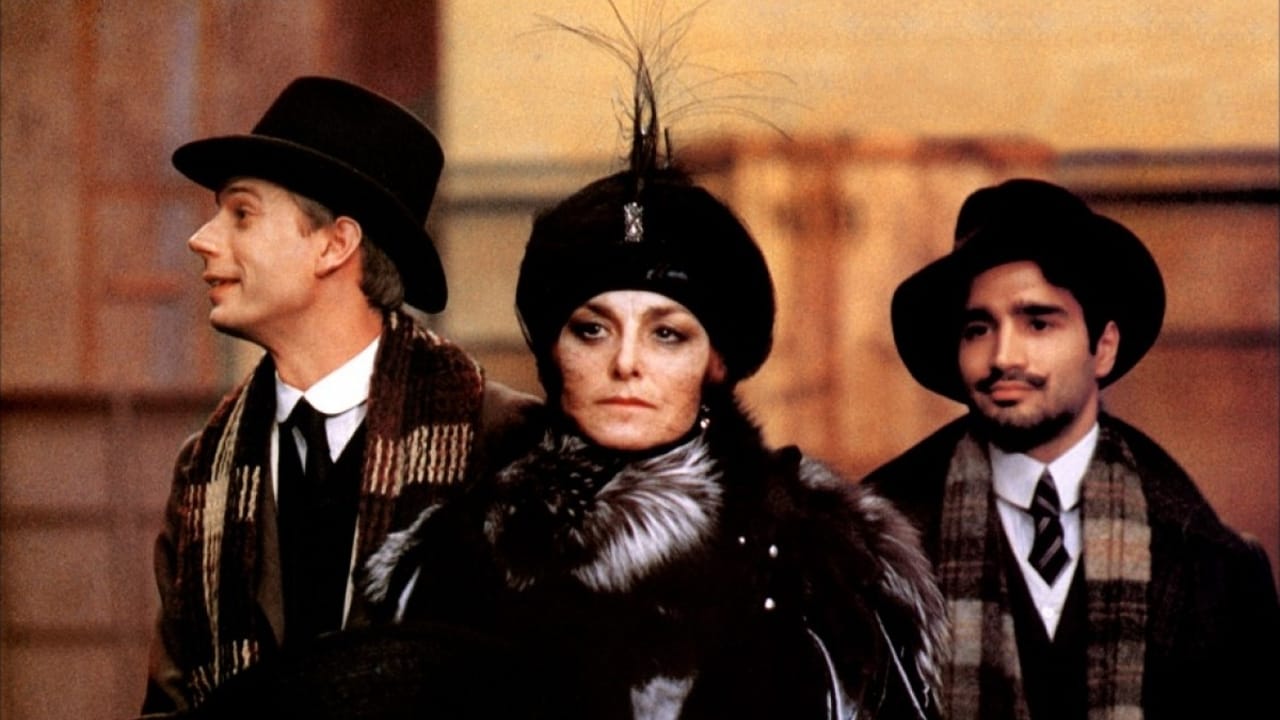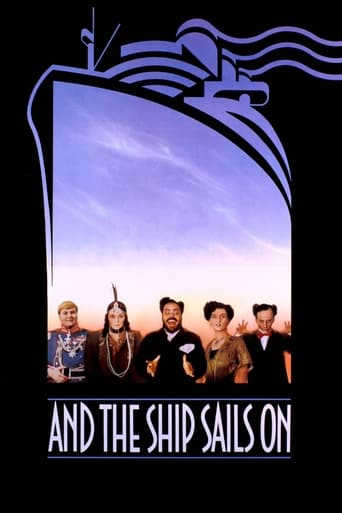

There is a roll of directors of whom one must claim to be an encomiast, if one wants to be held as an intelligent, sensitive person. Regardless of one's inner and uncontrollable reactions to their work, the mandatory comments as the credits go by are "what a masterpiece!", "best Italian director ever!", "delightful and subtle!" and the like -- well, unless there is no one around. Thus, let us leave the unqualified praise to the wannabe intellectuals and talk sincerely about this one."And the ship sails'" famous opening sequence may look interesting when you hear of it, with its silence and sepia colors ushering you into 1914, but watching its lousy sketches amid Italian proverbial disorder is not exactly thrilling. After the first metalinguistic appearance of the journalist Orlando and a short singing by the passengers, they go aboard, the ships leaves port, and the movie actually begins.The music is splendid, and the scenery and the costumes do not fall short of it. A scent of affection and artificiality pervades the whole movie, but that is quite inevitable with all that opera singing. To my surprise, the meta-linguistics represented in the journalist's character does not hamper the natural flow of the sequences. On the contrary, his peaceful nature sets a welcome contrast with the austerity around him.A real contrast, though, only takes place as the Serbians refugees are sheltered on the ship. Not that it is thoroughly explored by Fellini. Truth is, surprisingly as it may seem, he never abandons a rather superficial display of the relations that develop above the sea, both of the passengers between one another and between them and the Serbians. Sociology is not to be found here; beauty and pureness is what this movie is about.
... View MoreThat's totally true, Adam. Fellini says in few minutes what directors and writers wanted (do they really want?...) to say in many ignorant movies, like Spielberg's or Cameron's movies. Pay attention that "ignorant" is not an injury, it's simply an adjective for those kind of movies that just don't promote the intellect. But, hey, we are talking about show business, not "art business" or "show art", but "show" and "business". But I really think it's a waste of time to do a movie just for people laugh or cry and do it mentally ill. So then it's not correct to call people like Spielberg and CIA. as "artists", because they have the same job as the magicians in children parties. Fellini is an artist, he makes real art, not just for making businesses or a great stupid show to people be delighted with the illusion of the happy endings.
... View MoreMusic and color, passion and lucidity, tragedy and comedy. Yes, all of them and some more are contained in this masterpiece! From the one of the most originals beginnings in the film history to some pure perfection moments, this movie does not disappoint. Bare in mind this is a FELINNI movie, so your `normal' perception of a movie should be altered to a more `felinnian' way I have to say that this movie would stay in my memory long before those `Hollywood blockbuster' movies would be forgotten! There is one complain I have to make: the dubbing of some of the characters! I really don't know what Felinni had in mind, but sometimes is really annoying their pronunciation!! I give this movie 9 out 10!!! If you want food for your soul watch this one PLUS `Juliet of the spirits'!!!
... View Morefirst five minutes of `E La Nave Va` was what attracted me most from this movie (not meaning that the rest of it was not interesting). i thought that it should be a silent movie but then i realized that there were some inaudible voices coming from the background. then i asked myself whether there's a problem with the sound system or not. but just as i was thinking about this, voices started to be audible. and the black and white movie became coloured when the ashes were taken to the ship with ceremony. i guess the purpose of using black and white and silent cinema techniques before the ship scenes was to underline the fact that the important factor in the film was the ship itself. life without the ship was black and white (probably meaning boring and full of cliches). but when we enter the world inside the ship (or when we enter the world through Fellini's eyes), we see that there are lots of differences from reality. and that makes the ship coloured! Fellini had created so many symbols including the rhinoceros and the ship itself. but these symbols are not so clearly defined so after watching the film, the audience leaves with some question marks. even if you are not interested in the plot, watch this for a good visual treat. Fellini has reminded me that the cinema is an art which underlines the importance of visual structure.
... View More